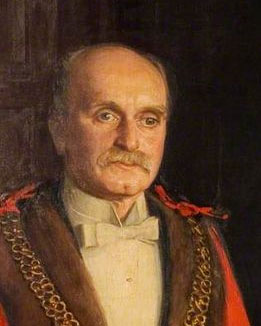
Triumph People : Siegfried Bettmann

Siegfried Bettmann is important in that he founded the company, and also came up with the "Triumph" name!
Siegfried Bettmann was a German from Nuremberg in Bavaria. Along with many other German Jews in the 19th Century, he emigrated to Britain which was considered a more liberal country with greater freedom of speech than in Germany at that time. Like many of his compatriots he first settled in London where he met fellow German Mauritz Schulte, a trained engineer. They applied for jobs advertised in the ‘Daily Telegraph’ and Bettmann ended up in Coventry, then a hub for engineering. He worked first for Kelly’s Directories and then with the American White’s Sewing Machine Company for which he was a commercial traveller covering not only this country but also Europe. He married a local girl, Annie Meyrick (he named a charity he founded in 1914 after her).
In 1886 with money from his and Mauritz Schulte’s families he started his own company called S. Bettmann & Co. Initially an Import & Export Agency, he started selling bicycles made in Birmingham by pioneering manufacturer William Andrews. Initially branded with Bettmann’s name, he later changed this to Triumph as he thought this would be better understood in most languages. In 1887 his friend Mauritz Schulte joined as a partner. Schulte persuaded Bettmann that it would be a good idea to manufacture his own bicycles and to this end they acquired a small former ribbon-weaving factory on Much Park Street in Coventry. A notable investor at the time was the Dunlop Tyre company.
Production of Triumph bicycles started in 1889. Mauritz Schulte then encouraged his partner to expand by motorising the bicycles, and by 1902 they eventually produced their first motorcycle, designed by Schulte. This used a single-cylinder Belgian Minerva engine, fitted onto a bicycle frame. By 1904 they started using engines made in Britain by the well-known JAP company (J. A. Prestwick) and these were used to power proper motorbikes, not just motorised bicycles. In 1905 they at last produced a motorbike with an in-house engine. Initial production of 5 per week increased to 60 per week in 1909.
Siegfried Bettmann was elected Mayor of Coventry in 1913. He was also a founding member and former president of the Coventry Chamber of Commerce and president of the Coventry Liberal Association (until 1940). Unfortunately, at the outbreak of war in 1914 he was forced to step down from Mayor due to his German connections, even though he was now a British citizen, and his company had supplied 30,000 motorbikes to the Allied war effort. He ploughed some of the profits of his company into a charity called the Annie Bettmann Foundation in honour of his wife Annie. This provided grants to help young men and women start their own businesses, extended to include further education. This fund still exists (now worth around £250,000). In 1921 he commissioned a memorial for the 66 Triumph employees who were killed in the war. This still stands in London Road cemetery.
In 1919 Claude Holbrook joined the company, and he was instrumental in persuading Bettmann to make motor cars. This he did by acquiring the assets and premises of an existing company, the struggling Dawson Car Company. The first ‘Triumph’ Car was the 10/20 designed by Lea-Francis. The most successful Triumph car was the Super 7, made to compete with the popular Austin 7, but with better features. This was designed by ex-Lea-Francis employee Arthur Sykes, and between 1927 and 1934 some 17,000 were produced.
In 1936 financial problems led to Triumphs selling off the Motorcycle part of its business to Jack Sangster of Ariel Motorcycles (although there have been various changes of ownership, Triumph motorcycles are still made today). However, this was not sufficient to turn the company around, and in 1939 the Triumph Motor Company went into receivership and was purchased by Sheffield based steel and engineering conglomerate Thomas W Ward. Soon after the second world war broke out and the factories in Holbrook Lane were completely destroyed by German bombs. The only remaining asset, the ‘Triumph’ name was bought by Sir John Black of the Standard Motor Company, also in Coventry.
Siegfried Bettmann spent his later years in relative obscurity, dying in 1951 aged 88. He maintained connections with his own company up to the outbreak of the second world war, and lived to see his company acquired by the Standard Motor Company in 1945. His name and legacy live on and a plaque has been unveiled in his memory in Coventry's Cathedral Square, where Triumph’s sprawling Priory Street works once stood.
![]()